|
|

Casablanca -
The Classic Film Score and Song
on its 75th anniversary
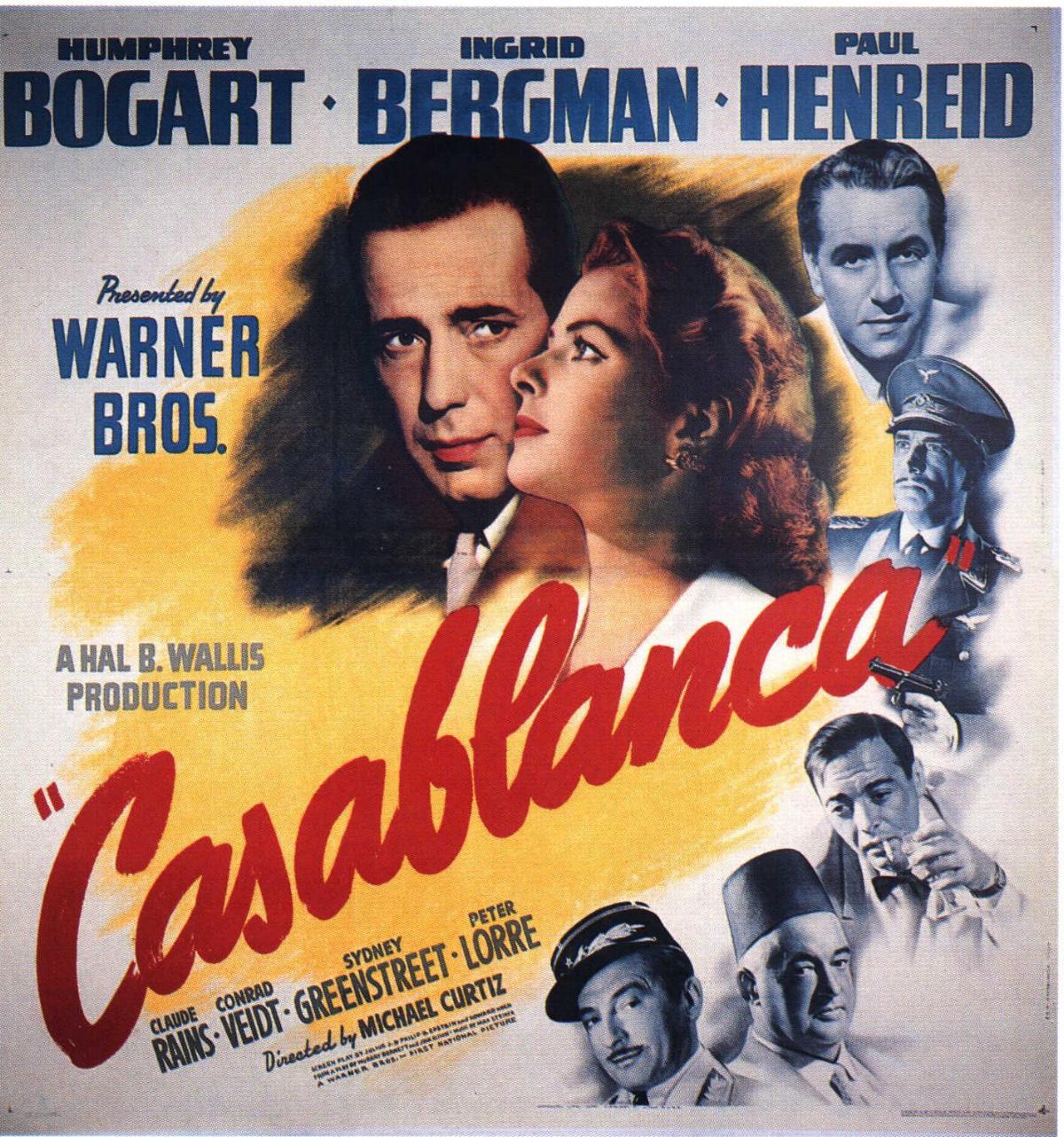
It was in November of 1942
that a film classic was born.
After 59 days of film shooting, CASABLANCA was finished on August 3 at a cost of about $950,000 -- not a cheap budget but not a blockbuster budget either.
The film was first released
on November 26, 1942, just a few days after the Allies had landed in North Africa at -- guess where? Casablanca.
So that was a natural connection to what was then happening during World War II.
The film release nationwide was several months later on January 23, 1943. That date was chosen to tie-in with the conference in Casablanca between President Franklin Roosevelt and British Prime Minister, Winston Churchill.
Was this a Hollywood attempt to cash in on the war?
It sure seemed to be. And it worked mainly because the film was so exceptional
in every facet, from the script to the acting and direction and also the music.
CASABLANCA was later nominated for 9 Oscars and received three of them:
Best Film: Hal B. Wallis, Producer
Best Direction: Michael Curtiz
Best Screenplay: Julius J. and Philip G. Epstein, Howard Koch
Almost everyone knows by now that the film starred
Ingrid Bergman, Humphrey Bogart, and Paul Henreid.
Also appearing in the film are a group of first rate character actors:
Claude Rains (Captain Louis Renault),
Sydney Greenstreet (Signor Ferrari),
Peter Lorre (Signor Ugarte),
and the nasty Nazi villain:
Conrad Veidt (Major Heinrich Strasse) --
all shown in the above film poster.
There are also two musicians who deserve much credit for the success of CASABLANCA: Max Steiner for his memorable film score, and singer,
Dooley Wilson, for his unforgettable singing of "As Time Goes By."
It needs to be emphasized, for those who don't already know it,
"As Time Goes By," was not a song written for CASABLANCA, and was not,
introduced with this line:
"Play it again, Sam" (used in a Woody Allen film).
In CASABLANCA, Humphrey Bogart just says to Sam: "Play it!"
And "play it" was what has happened over the years.
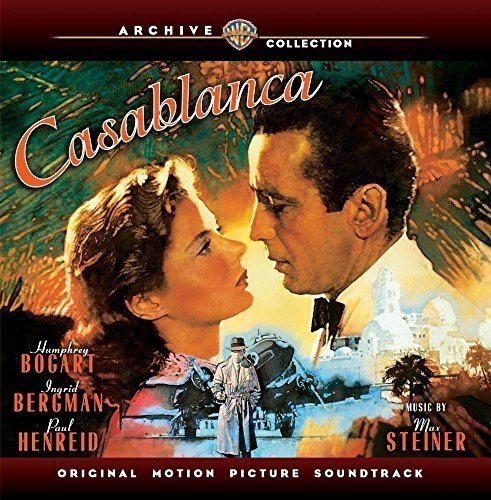
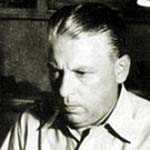
"As Time Goes By" had music & lyrics by Herman Hupfeld (1894-1951),
who lived his entire life in
Montclair, New Jersey,
near where I grew up as a youngster. Hupfeld
had reportedly written his immortal song at the Robin Hood Inn in Clifton, NJ.
That restaurant was
a favorite of my mother
though she did not hear Hupfeld playing the piano there.
I was at that restaurant too but we were there after Hupfeld had died.
As I wrote in my book, A Guide to Film Music: Songs and Scores (PineTree Press),
the song was written by Hupfeld back in 1931 for a Broadway play,
Everybody's Welcome, and the song was sung by Frances Williams.
Murray Burnett was working on another play around 1940 with his co-writer, Joan Alison. He remembered that song and suggested using it in their play which was tittled: Everybody Comes to Rick's. That play became the basis for the screenplay of CASABLANCA, seasoned with a flavorful amount of fun dialogue by the brilliant screen writing twin brothers:
Julius and Philip Epstein.
"As Time Goes By" had a decent success after it appeared in the 1931 Broadway play and it was recorded by Rudy Vallee and Binnie Hale, plus several popular bands at that time.
So it was known before CASABLANCA was made
and the song
was purchased by Warner Brothers.
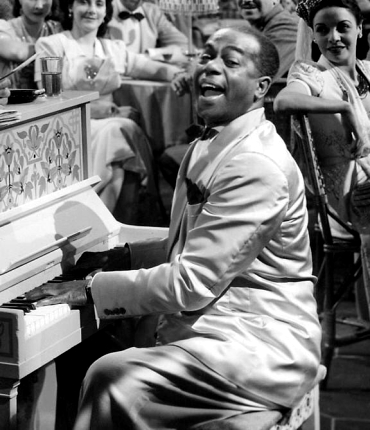
Dooley Wilson was a wonderful singer but he was not a pianist. It has long been accepted that Elliott Carpenter played the piano for the scenes with the songs, including for "As Time Goes By." Recently, two other names have been mentioned who played piano for the film's recording sessions: William Ellfeldt and Jean Plummer. In his article, Dr. Robert E. Wallace, a medical physicist, makes his case for Plummer as the one who actually played piano for the Dooley Wilson songs including "As Time Goes By." Dr. Wallace consulted with a UCLA musicologist for a professional evaluation. The assumption was that Carpenter could not have performed for the film because his other recordings sound different. This is such a ridiculous evaluation! What pianist sounds exactly the same in every performance or recording they make? Plus the fact that Carpenter had claimed to be the pianist for many years. In 1972, he wrote to his friend and prominent pianist, Eubie Blake, and mentioned he was finally getting credit for accompanying Dooley Wilson in the film. Why would he claim to be the pianist if he did not record the music? Was he trying to impress Eubie Blake? That is doubtful. Without any substantial proof, I still accept that Carpenter was the pianist accompanying Dooley Wilson,
as mentioned by previous authors,
like Charles Francisco in his worthwhile book,
You Must Remember This: The Filming of Casablanca.
To watch the famous scene when the song is sung by Dooley Wilson -- click here
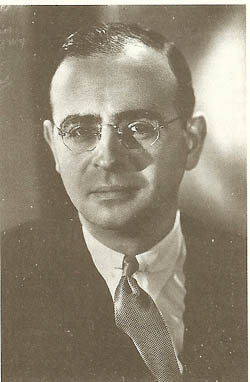
When "As Time Goes By" was heard in the film, it became very popular on records too and was on the Hit Parade for 21 weeks in 1943,
but not the iconic rendition by Dooley Wilson from the film soundtrack.
Though it was the most popular of the American songs in the film, there were others played too, like "It Had To Be You," "Shine," "Knock On Wood," "The Very Thought Of You," "Baby Face,"and others. I believe it was Max Steiner (shown above) who greatly increased the effectiveness of that song with his skilled orchestral arrangements of the song. Surprisingly, he didn't like the song at all and thought it was rather square, and perhaps more importantly, he couldn't collect any royalties for it. He wanted to write his own song. But he had to admit that the song "must have had something to attract so much attention." Today, it's hard to imagine that Steiner would even think of leaving out "As Time Goes By" from the film. It's such an essential part of the film, like a musical co-star. But being the great film composer that he was,
Steiner made the most of the song's melody
and turned it into a memorable theme used in key scenes.
He was one of the first composers to be named for
Lifetime Achievement on the Sammy Film Music Awards.
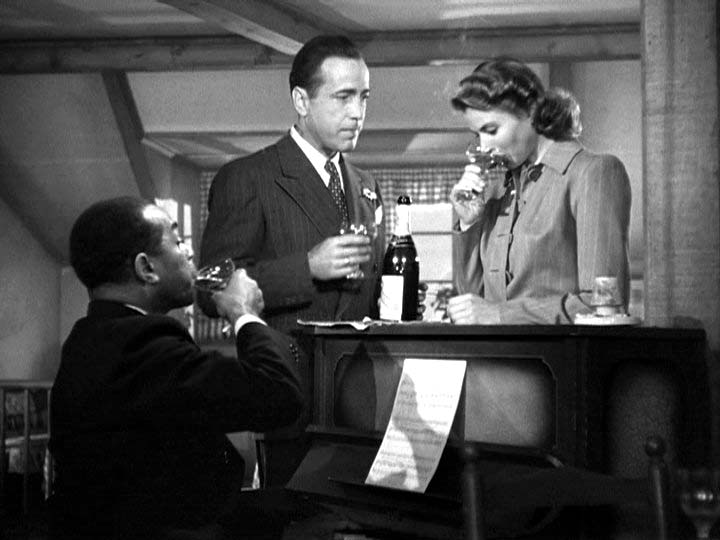
One of the key scenes was a flashback to Paris where Rick Blaine (Humphrey Bogart) says lovingly with his glass of champagne
to the beautiful Ilse Lund (Ingrid Bergman):
"Here's looking at you, kid."
For his score to CASABLANCA, Max Steiner was nominated for an Oscar in 1943 but lost to another popular score by Alfred Newman for THE SONG OF BERNADETTE. Steiner did receive an Oscar in 1942 for another of his memorable scores, which again starred Paul Henreid, this time teamed up with Bette Davis in
one of her great signature roles for NOW, VOYAGER.
That film also had a memorable song, "It Can't Be Wrong," lyrics by Kim Gannon,
based on the love theme composed by Max Steiner. So he did get royalties for that song.
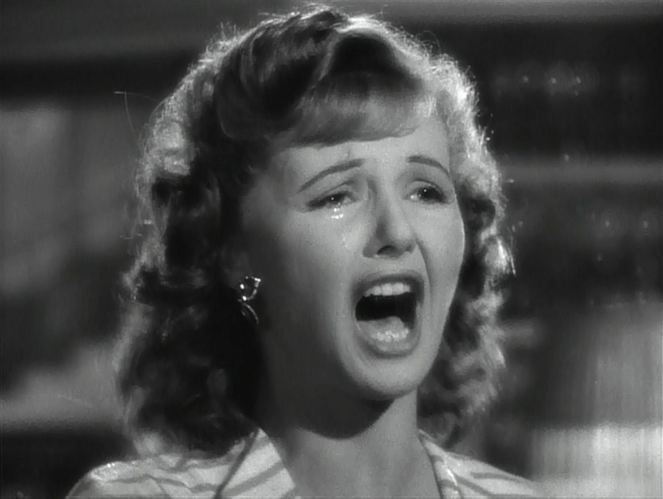
Besides "As Time Goes By," there are also several national songs used in Steiner's score. One of the most memorable scenes in the film is when the Nazi officers begin to sing the German song, "Die Wacht am Rhein," but it is overpowered by the customers in Rick's Cafe who sing "La Marseillaise," after the orchestra is told to play it by Victor Lazlo (Paul Henreid). This is a highly charged scene especially with the tearful singing by French actress, Madeleine Lebeau (shown above). It still can bring a lump to the throat or tears to any in the audience with the powerful statement made against such tyranny
told
with such musical forcefulness.
Like so many others, I have remained a fan of this classic film and its music score
ever since I first watched it on television many years ago. Since then I have purchased the VHS tape, DVD and Blue-ray versions. Also several different CD releases too..
It's a film that keeps on giving in so many ways.
On my old radio program, "In The Mood," I played Dooley Wilson's singing of
"As Time Goes By" on a special program with my choices for
Top Ten Movie Songs and Scores from the past.
You might guess which song was my No. 1.
As the song says so well "the fundamental things apply, as time goes by."
On its 75th anniversary, besides the superior actors, direction and script,
two other "fundamental things apply" --
the composer
and the singer.
Both of them helped to make CASABLANCA
the great film classic it became.
And it remains so -- "as time goes by."
-- Roger Hall,
Film Music Review
November 2017
Read about how the score and song
were used in CASABLANCA
in this book:
.jpg)
An accompanying CD
is also available separately titled
after the song --
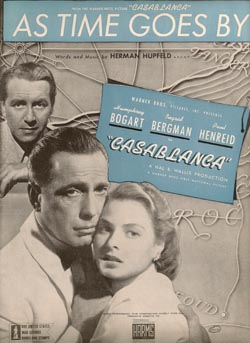
A Listener's Guide To Film Music
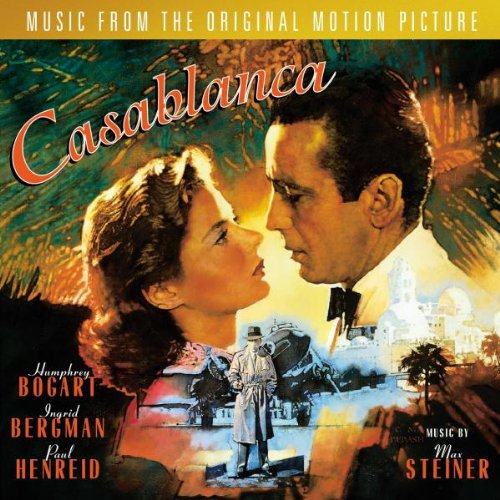
For fans of the film this is the best CD to have,
since it contains the
songs, Steiner's score,
and dialogue from the original film,
plus a few alternate versions -- click here
To hear a Suite of music by Max Steiner from the film
on YouTube -- click here
.jpg)
Blu-ray Disc
Highly recommended book about the film:
We'll Always Have Casablanca
by Noah Isenberg
(W.W. Norton & Company, 2017)
To send your comments or questions:
click here

Film Music Review
Return to top of this page
|
|
|
